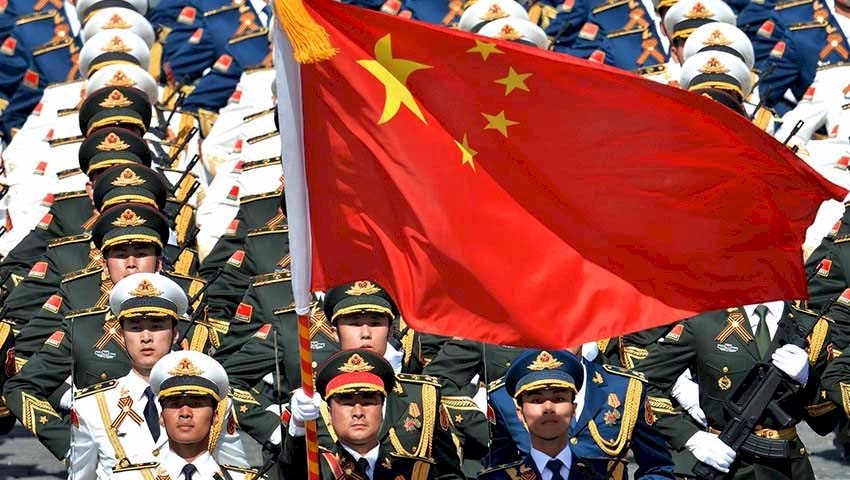Lucrative deals between Chinese-owned entities and Hollywood have given CCP operatives a VIP pass to censor Western films and media.
The exploitation of media outlets has been codified as an essential military vector to dominate for the CCP. Not only does a competitive control over information enable militaries to tap into emerging sectors of support, but it also enables them to address and shut down dangerous political messages that run contrary to their broader interests.
So much so is information manipulation a core military doctrine for the People’s Liberation Army, that exploitation of news and the media has been placed under the control of the PLA’s Strategic Support Force alongside cyber warfare.
“The PLA introduced Three Warfares doctrine in 2003, centred around psychological warfare, public opinion warfare, and legal warfare in response to the effective psychological operations and effective use of media executed in the Iraq War and other recent conflicts,” professor of society computing at Carnegie Mellon University Kathleen Carley and PhD candidate Charity Jacobs recently wrote in the Small Wars Journal.
This isn’t a far off phenomenon. Rather, it’s happening in the West’s backyard.
Recent research presented by psychological operations officer Morgan Martin and civil affairs officer Clinton Williamson has demonstrated that China’s manipulation of mainstream media is occurring on the US homeland.
Writing for the Small Wars Journal in early March, the pair analyse research from 2017 by Darren Tromblay and determine that recent economic and political coercion from Beijing has enabled China to exercise significant creative control over Hollywood and that China uses American cinema to “achieve its political objectives… with a minimum of saber-rattling”.
The pair note that such a revelation should be unsurprising, with a long history of governmental manipulation of cinema to achieve political end states.
“The coordinator for the US government’s WWII-era domestic propaganda efforts, Elmer Davis, had this to say about it: 'The easiest way to inject a propaganda idea into most people’s minds is to let it go through the medium of an entertainment picture when they do not realise that they are being propagandised',” the pair note.
Martin and Williamson argue that the efficacy of political propaganda in films has been corroborated by empirical data, citing recent research in the Social Science Quarterly that audiences are more likely persuaded by media when “they’re unaware that entertainment’s message is political”.
For many in the Hollywood film industry, the growing Chinese market has proven too lucrative to turn down.
“The PRC has expanded its de facto control over the American film industry through investments, economic coercion, and acquisitions,” the pair note.
“They have made direct investments in three of the five major Hollywood film studios (Sony, Warner, and Universal) and are able to exercise economic leverage over four (Sony, Warner, Universal, and Disney). A Chinese-owned company, Dalian Wanda, purchased both Legendary Pictures and the AMC Theater chain in the mid-2010s; with more than 8,000 screens in over 600 locations nationwide, AMC is the single largest theater chain in the US.”
Morgan and Williamson suggest that American audiences are already feeling the brunt of Chinese censorship in the media, whether tweaking the backgrounds of characters or when censors “completely erased references to Taiwan (Maverick’s jacket patches in Top Gun: Maverick)”.
Reporter Erich Schwartzel in the Atlantic further details the direct link between Chinese funding and Hollywood’s willingness to adapt their films to Chinese requirements.
The financial ties include a $500 million agreement between Universal and a Chinese company and “Metro-Goldwyn-Mayer [shopping] itself for a Chinese takeover”.
“Unbeknownst to most moviegoers, studios were removing scenes and dialogue from scripts and finished movies to appease Chinese censors — scrubbing any production of plot points that brushed up against sensitive Chinese history or made the country look anything less than a modern, sophisticated world power,” Schwartzel wrote.
Many in the West had already woken up to the impact of Chinese censorship in the media. John Cena, fan favourite wrestling star who boasts legions of followers the world over, was forced into a grovelling apology for accidentally referring to Taiwan as a country.
Per popular request, here's Mr. John Cena's apology video with English subtitles. I kept all the incoherence in the video, as well as the curious absence of what he's actually apologizing for pic.twitter.com/WmJlRcyOID
— Tony Lin 林東尼 (@tony_zy) May 25, 2021
The information age has heralded revised lessons for the military community. Sun Tzu wrote over two millennia ago that “to win one hundred victories in one hundred battles is not the acme of skill. To subdue the enemy without fighting is the acme of skill”.
If life imitates art, then Hollywood has chartered a precipitous decline for the West.
Get involved with the discussion and let us know your thoughts on Australia’s future role and position in the Indo-Pacific region and what you would like to see from Australia's political leaders in terms of partisan and bipartisan agenda setting in the comments section below, or get in touch with



